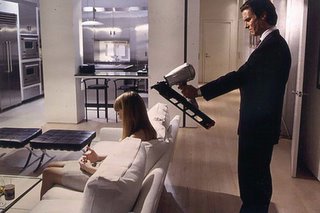 Walk the Line (2005)
Walk the Line (2005)Premise: Covering the 20 year period of Johnny Cash (Joaquin Phoenix)’s life, the 50s and 60s, when he toured constantly and survived on pills and liquor, frustrated by his obligation to his wife, Vivian (Ginnifer Goodwin), and his desire for his true love, June Carter (Reese Witherspoon).
In other words, not my Johnny Cash – the black robed father figure preacher man. More like my dad’s Johnny Cash.
Okay, let’s get a couple little things out of the way: (1) I’m naturally biased towards a movie starring my favourite actor and about one of my favourite couples. It’s a movie targeted directly at me squared. (2) This is going to be a long review. Buckle up.
While watching the movie, the number one word I used to describe it was “electric.” Afterwards, I thought enough to add “balls out.” One of these epithets has never been used in the history of Feria Films, which should give you a sense of where this movie sits in my mind.
Here’s the thing about biopics: If you attempt to tell an entire life story in 2-3 hours, you tend to discredit huge chunks of an individual’s life. Furthermore, when portraying a public figure, there is a fair amount of pressure on the actor playing him/her. You have to contend with the public impression of the persona, the written material about the person, and the personal recollections of family and friends. In other words, it’s tough. You can try to inhabit the skin of the person you are portraying, matching his/her mannerisms and intonations exactly. When done well, you end up with something (I hear) like Philip Seymour Hoffman in Capote. If you take this too far, you end up with a complete caricature. You could go the route of approaching the person as a character, rather than a fully fleshed out public individual, but, if this doesn’t come off as a caricature, it will come off as incomplete.
So, basically, if you don’t have the requisite talent to become this other person, you are completely screwed.
What makes Phoenix and director/co-writer James Mangold’s choice balls out here is their decision was neither to aim for a spot-on “impersonation” nor to treat the man (with whom they worked before his death in 2003) as a character. Phoenix, under Mangold’s direction, sought a much loftier goal: to capture the essence of the Man in Black.
To wit, I am here to tell you that Phoenix nails it. There is no other actor on the market today that can so convincingly portray a plethora of emotions simultaneously. At any given moment, Phoenix could be smart, stupid, sexy, charismatic, angry, confused, sorrowful, violent, lustful, loving, and repentant. I thought of a lot more emotions he conveyed, but, much like my focus on Strathairn in Good Night, and Good Luck., I could go on all day. Phoenix’s Cash, rather than acting with full knowledge of the way things would turn out, played Cash’s addiction beautifully: rock bottom never came soon enough. He never intended to hurt Vivian, but he didn’t know how to stop himself from wanting June. He didn’t want to destroy his family, but he didn’t believe he could survive without the pills.
Haun
 ted by the loss of his best friend and older brother, Jack (Lucas Till), and the knowledge that his father (Robert Patrick) will never consider him a suitable substitute, Phoenix is, above all, a big ball of hurt. When he sneers at Sam Phillips in his first stiff audition, well, you know he’s in for a rough ride. Which is good for you, the viewer, as it means you are in for a breathtakingly balls out and electric performance. As a bonus, Phoenix does all the vocals (!) and plays the guitar (!!) himself. Take that, Jamie Foxx.
ted by the loss of his best friend and older brother, Jack (Lucas Till), and the knowledge that his father (Robert Patrick) will never consider him a suitable substitute, Phoenix is, above all, a big ball of hurt. When he sneers at Sam Phillips in his first stiff audition, well, you know he’s in for a rough ride. Which is good for you, the viewer, as it means you are in for a breathtakingly balls out and electric performance. As a bonus, Phoenix does all the vocals (!) and plays the guitar (!!) himself. Take that, Jamie Foxx.The electricity that crackles and snaps in Mangold’s tense opening sequence positively threatens to consume the whole theatre whenever Witherspoon and Phoenix share the screen. Witherspoon, to her immense credit, never allows Carter to come across as some sort of a Madonna, regardless of her position as Cash’s saving grace. She may have helped him kick the pills and booze, but she certainly didn’t take his drunken antics before that lying down. John
 Carter Cash never knew it until they made the movie, but this was the woman who threw beer bottles at Cash and crew in a fierce admonishment. This was the woman who penned Cash’s (arguably) most famous song about a passion so fiery and dangerous that it threatened to burn them both alive: Ring of Fire. She was strong and sassy and a pistol if there ever was one. Witherspoon brings all of this and more to what would be, in lesser hands, nothing more than a platitude spouting cipher. As a bonus, she does all the vocals (!!!) and plays the autoharp (!!!!) herself. Take that squared, Foxx.
Carter Cash never knew it until they made the movie, but this was the woman who threw beer bottles at Cash and crew in a fierce admonishment. This was the woman who penned Cash’s (arguably) most famous song about a passion so fiery and dangerous that it threatened to burn them both alive: Ring of Fire. She was strong and sassy and a pistol if there ever was one. Witherspoon brings all of this and more to what would be, in lesser hands, nothing more than a platitude spouting cipher. As a bonus, she does all the vocals (!!!) and plays the autoharp (!!!!) herself. Take that squared, Foxx.Not that I have anything personally against Jamie Foxx. I’m just sayin’.
The only misstep I can think to point out is in the way Vivian is written. Maybe it’s Goodwin’s performance, although I always did enjoy her as Diane on Ed. Maybe, though, Mangold and co-writer Gill Dennis didn’t, or couldn’t, give Goodwin much to work with. Or maybe she was a hellish shrew who thoroughly resented her husband’s career. I don’t really know.
As for Tyler Hilton as Elvis or Waylon Malloy Payne as Jerry Lee Lewis (with whom Cash did assuredly tour), I didn’t buy Hilton as Elvis until he stepped behind the mic. Suddenly, he became Elvis. Weird, huh? Payne makes more of an impression as Lewis, who, seriously, always seems out of his mind. I could have been partial to him, however, as I think Payne as Lewis looks like James Marsters as Spike. Waylon Jennings’ son Shooter playing the father? Sure, why not.
Speaking of Buffy, how great was it to spot Big Gay Larry as Marshall Grant, Cash’s bass player? It was great is what it was.
At the time that I am writing this review, the current user comment on IMDb says, and I quote, “Joaquin Phoenix is brutally hot as Johnny Cash!!” Although I initially cracked up (user comments tend to be written by morons), it’s a fair assessment. Not only do I also think Phoenix is and was hot, it is brutal. Probably not in the way “lgran81” meant, but it is true. Phoenix’s portrayal of the towering legend never betrays his public persona, the volumes of material about a country singer who managed to be fully accessible to those who don’t even like country, or the many fond memories of those who knew him (Carter Cash thought Johnny himself would have approved, after all). It’s not a betrayal because it is exactly what lgran81 thinks it is: brutally ho[nes]t. A
P.S. The smatter of appulase afterwards made me wonder if those hippes over at the Bytowne would have given in the standing O treatment it deserves. Probably.
P.P. S. I knew that that wizard would trounce the Man in Black at the box office opening weekend. I’m cool with that. But now that you’ve seen the longer movie, I recommend that you see this film.










